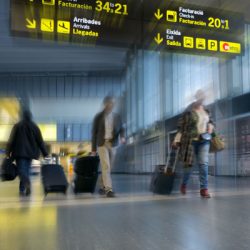Case Study: Fraport’s network infrastructure management
Learn how Fraport achieved better documentation and management of their complex and evolving telecommunications and IT infrastructure – at lower cost.
List view / Grid view


‘Seamless travel’ is a term frequently being used to describe the optimum passenger experience, meaning a traveller can complete the entire airport journey without experiencing delays, disruption or confusion.
Self-service technology, predictive analysis, artificial intelligence, real-time information and data-sharing are just some of the digital concepts airports around the world are deploying in an attempt to achieve a seamless passenger experience.
International Airport Review, within this core topic, endeavours to provide case studies on how airports from all corners of the world are working on improving their passengers’ experience. This covers both inside the terminal, and initiatives implemented outside of the terminal that focus on ensuring the passengers’ arrival to the airport is as easy as possible.
This is a key theme in the airport industry that must not be overlooked: As passenger expectations evolve, an airport’s response must do so too.
Learn how Fraport achieved better documentation and management of their complex and evolving telecommunications and IT infrastructure – at lower cost.
Research that was commissioned by the Australian Airports Association found that 52 per cent of respondents were discouraged from booking travel too far in advance due to the risk of sudden border closures.
Recently published data indicates that PRM traffic is returning to the skies at a faster rate than total passenger traffic, explains accessible air travel expert, Roberto Castiglioni.
Ordering food and beverages at Miami International Airport is now as safe and easy as click, grab and go with MIA2GO, the airport’s new contactless mobile platform that puts customers in the fly-through lane to quickly browse menus, order and pay before making their pick-up at restaurants throughout the airport.
The ACI Airport Health Accreditation, along with certification by Deutsches Hygienezertifikat guarantee a highly safe experience for passengers using Terminals 1 and 5 of the new airport.
Dr. Ralf Gaffal, Managing Director of Munich Airport International’s (MAI) Business Division, spoke to International Airport Review about the key challenges and questions that airports need to address sooner rather than later, highlighting best practices and using Munich International Airport (MUC) as an example.
17 December 2020 | By NEXTT Vision (IATA & ACI)
As a joint initiative of ACI and IATA, NEXTT (New Experience Travel Technologies) creates a shared vision for the future of travel. While the first webinar confirmed the validity of and the need for the concepts of NEXTT in these difficult times for the air travel industry, this second webinar looked…
The IATA Travel Pass is a bold step forward in the implementation of contactless travel.
John Holland-Kaye, CEO of Heathrow Airport, stresses the importance of the industry working together on a Common International Standard for aviation health testing, because, once the pandemic is over, the next hurdle will be climate change.
On 25 November 2020, the International Air Transport Association’s (IATA) webinar was hosted by International Airport Review. It went through the main data privacy challenges and how they could be addressed within the One ID Ecosystem and supporting standards.
In this issue we feature articles from industry experts on a vast range of topics including: how the new Salt Lake City International Airport will provide passengers with an entirely new experience; a look at whether the two-tier fire protection system developing at some key airports is potentially affecting the…
Istanbul Airport is now one of only two airports in the world that is certified with both the "5-Star COVID-19 Airport" and the "5-Star Airport" rating.
The sunflower lanyard initiative will support passengers with hidden disabilities travelling through Wellington International Airport.
The autonomous robot is said to eradicate 99.9 per cent of pathogens, including COVID-19, and disinfects the air using UV technology.
Passengers arriving in England from countries that are not featured on the UK government's travel corridor list will now need to self-isolate for 10 days, instead of 14.